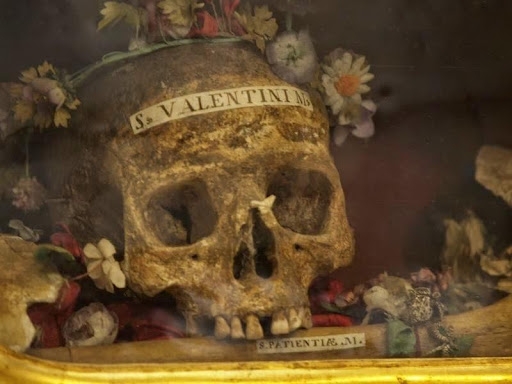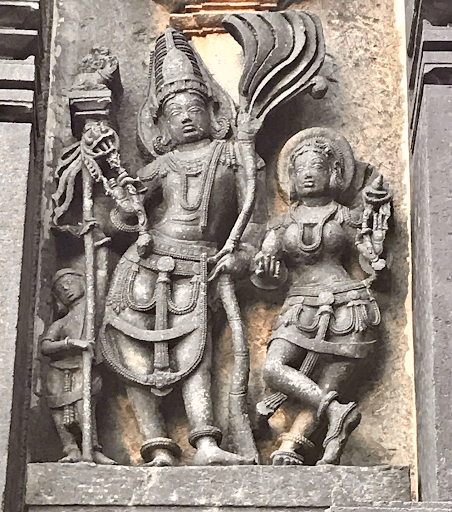Ancient Love Stories
14 Feb 2022 10:19:33
Valentine's Day, Promise Day etc. have become popular in the youth in the past few decades. This festival is named after at least two 3rd century saints named 'Valentine'. One of them, disregarded the ban imposed by Romans on the marriage of soldiers and officiated the weddings of many. The second one was imprisoned and sentenced to death for preaching Christianity. While in prison, he magically cured the daughter of an official. Before his death, he wrote her a letter and signed it as 'yours Valentine'. The 'Valentine Feast' was started in the memory of these two. Later, people started celebrating it as a festival of love between husband and wife.
 Yet, the finest love story ever is the story of Sita and Rama. Rama and Sita's unconditional love for each other is unmatched. Sita leaves the pleasures of the palace to be with Rama even in exile. While in exile, Rama takes great care to keep Sita happy. Rama is not fascinated by the beauty of Shurpanakha who has proposed marriage to him. And Sita does not find the wealth of Ravana attractive when Ravana proposes marriage to her. When Ravana imprisoned her in the Ashoka forest, Sita was ready to accept death rather than be unfaithful to Rama. While in order to regain Sita, Rama gathered an army, built a bridge over the sea and fought the all powerful Ravana! There is no better and nobler example of love than this.
Yet, the finest love story ever is the story of Sita and Rama. Rama and Sita's unconditional love for each other is unmatched. Sita leaves the pleasures of the palace to be with Rama even in exile. While in exile, Rama takes great care to keep Sita happy. Rama is not fascinated by the beauty of Shurpanakha who has proposed marriage to him. And Sita does not find the wealth of Ravana attractive when Ravana proposes marriage to her. When Ravana imprisoned her in the Ashoka forest, Sita was ready to accept death rather than be unfaithful to Rama. While in order to regain Sita, Rama gathered an army, built a bridge over the sea and fought the all powerful Ravana! There is no better and nobler example of love than this.
 We are sitting at the feet of a Kalpavriksha that can fulfill all our desires. We have grown in the lap of a liberal and generous culture that knows the needs of every stage of life and caters to it by providing various celebrations and festivals. And yet, instead of royally flaunting our cultural festivals we like a beggar went to the West to get a new festival of ‘Valentine’s day’. A festival that instead of admiring lovers, mistakenly celebrates the bachelor, who plays the role of a qazi, about whom the Church has said it knows nothing other than his skull. ...Surely we have gone wrong somewhere. For our young generations have grown up without listening to these splendid love stories ...
We are sitting at the feet of a Kalpavriksha that can fulfill all our desires. We have grown in the lap of a liberal and generous culture that knows the needs of every stage of life and caters to it by providing various celebrations and festivals. And yet, instead of royally flaunting our cultural festivals we like a beggar went to the West to get a new festival of ‘Valentine’s day’. A festival that instead of admiring lovers, mistakenly celebrates the bachelor, who plays the role of a qazi, about whom the Church has said it knows nothing other than his skull. ...Surely we have gone wrong somewhere. For our young generations have grown up without listening to these splendid love stories ...
The article was originally published in Mumbai Tarun Bharat

The skull of St. Valentine displayed in the church of Basilica of Santa Maria in Rome. Many Churches all over Europe have claimed to have the remains of St. Valentine.
According to some, the lovers in ancient Rome celebrated 14th February to welcome the approach of spring. In the 4th century, the Church converted this into a religious feast in the name of Saint Valentine. With time, the religious context was lost and it became a secular festival to celebrate love between couples. Meanwhile, in 1969, the Catholic Church discontinued the feast which took place on the 14th of February since no official information about the saint was available to them. In the recent 40-50 years, American consumerism has transformed this festival into a ‘Shopper’s day’. Now greeting cards, chocolates, roses, teddy bears etc. are sold in large numbers on 14th of February.
Here I try to bring forth a short review of Indian love stories on the occasion of Valentine's Day. These are some of the best love stories in Indian literature that have been told and retold since ancient times. There are many beautiful love stories in the Vedic literature, in Puranas, dramas, stories and poetry.
In the RigVeda, the Rishika Surya Savitri has written the "Vivah Sukta" (10.58). It describes the marriage of Surya, the daughter of the Sun, and Chandra, the moon. It has the vows of the bride and the groom and the blessings given to them by the bride’s father. In this Sukta, during the wedding ceremony, Chandra says -"I take the hand of my bride in mine with Agni as the witness. May all deities bless my bride! Oh Surya! May you always remain by my side. We shall build our home together. We shall nurture good progeny together. Your companionship in carrying out the duties of married life is an honour for me. We shall together acquire wealth (health, cattle, money, grain, house, etc.) May we live together for a hundred autumn seasons! May we never separate from each other. If I am the sky, you are the Earth! If I am a song, you are its lyrics! We shall be inseparable like them!" Even today, these are sung as vows in Hindu weddings.
Arthaveda has prayers to attract someone you love; and to make them fall in love with you! Atharvaveda also contains a 'Pati-Patni Sukta' (2.30). In it the husband prays, "May my wife stay with me for eternity, may she love me forever, may she never leave me and let me experience the pain of parting." The Rishi also tells the husband and wife in this Sukta- "May you two live together, walk together, work together, attain victory together and gain prosperity together. May your souls connect with each other! Go for a walk where the beautiful birds sing melodious songs. Have loving conversations with each other. Become ideal husband and wife!" What is love? How should one express love? How should husband and wife interact with each other? The advice given by the Rishi is applicable even today.
The Rigveda (10.95), Shatpath Brahman (11.5.1) and a few Puranas tell the tragic love story of Pururava and Urvashi. It is the story of mortal King Pururava and the immortal Apsara of Indra's Court, Urvashi. Kalidasa has written a play named Vikramorvashiya on this story. In this story, Pururava meets Urvashi while going to the court of Indra. They both fall in love with each other. Urvashi descends to upon the Earth to live with Pururava, but cannot stay long and has to return to Heaven. Pururava is left on Earth, wallowing in his loneliness. In Kalidasa’s version, she gets transformed into a climber and Pururava wanders in search of her in this form.
The epic Mahabharata tells many love stories. One of them is of Krishna and Rukmini. Rukmini, the princess of Vidarbha, wrote a letter to Krishna saying, "In the heart of my hearts, I see you and only you as my husband. But my brother wants me to marry another man. I request you to come take me away from here. If I marry, it shall be only to you." With the backing of that love letter, Krishna, cleverly eloped with Rukmini to Dwaraka where they got married. The daring Rukmini took the first step to propose and later marry Krishna. This wedding became the subject to many novels. The story of the wedding of Arjuna and Subhadra, wherein Krishna helped Arujuna to elope with his sister Subhadra is just as gripping. Then there is the story of the wedding of childhood sweethearts Abhimanyu and Vatsla with the help of Ghatotkacha and his mayavi forces, which is an excellent romcom. And there is another serious tale of Dushyant and Shakuntala. Dushyant married Shakuntala in the Gandharva way, and later refused to accept her as his wife. Instead of cowering and crying Shakuntala openly challenged him and called upon his conscience. Dushyant realized his mistake and accepted her as his queen. Amongst all these narratives, I love the story of Nala and Damayanti who are equal partners. And even in this story it is the lady Damayanti who displays courage, love and strategy to find her husband and reunite with him to live happily ever after.
Kalidasa’s account of Aj and Indumati in Raghuvansh is a sad and tragic love story. His story of Malvika and Agnimitra is another romantic comedy while the narrative of Yaksh and his wife from his Meghadoot is a fervent story of love and separation. Then there are many plays about king Uadayan like – Swapnavasavadatta, Pratidnya Yougandharayana, Priyadarshi, Ratnavali that tell tales of his romantic adventures. The ancient dramas also speak of the Madan who is the Devata of Love. He holds in his hand the sweet bow made of sugarcane and love arrows in his quiver. Madan-Utsav was celebrated at the advent of spring by young men and women of India with lots of enthusiasm.

Madan and Rati
We Indians celebrate so many love stories. Like Vivah-Panchami is to celebrate the wedding of Ram and Sita. Vata-Pournima is to celebrate the immortal love of Satyawan and Savitri. Hartalika is the festival to celebrate the ideal marriage of Shiva and Parvati. And then there is Karwa Chaut, Deepawali, Gaurihara puja Mangala-Gauri puja etc. to celebrate the love between husband and wife. Throughout the year these events give the husband and wife an opportunity to express their love for each other. These festivals teach the lessons of ideal love.
Translated by N Shrutakirti